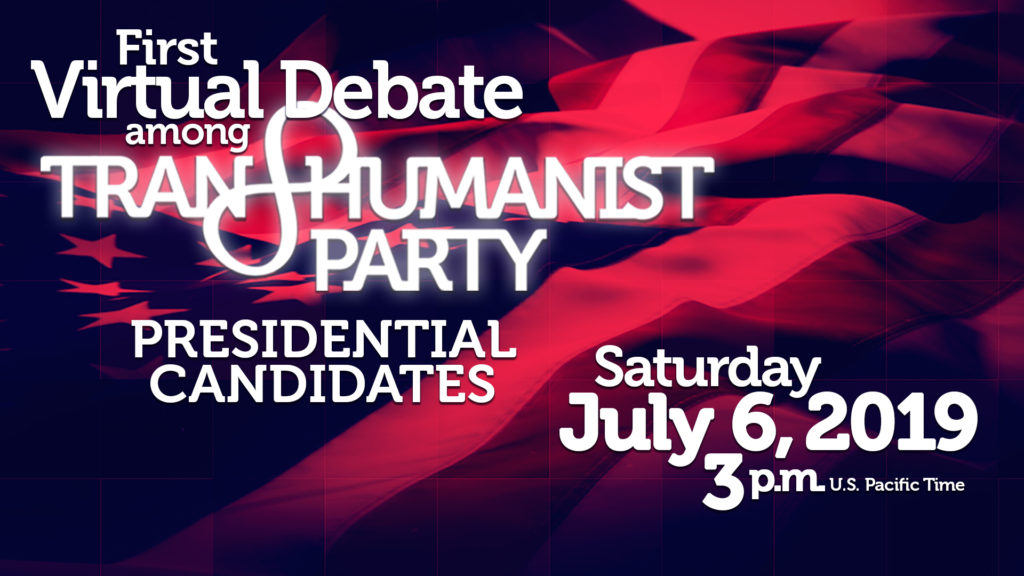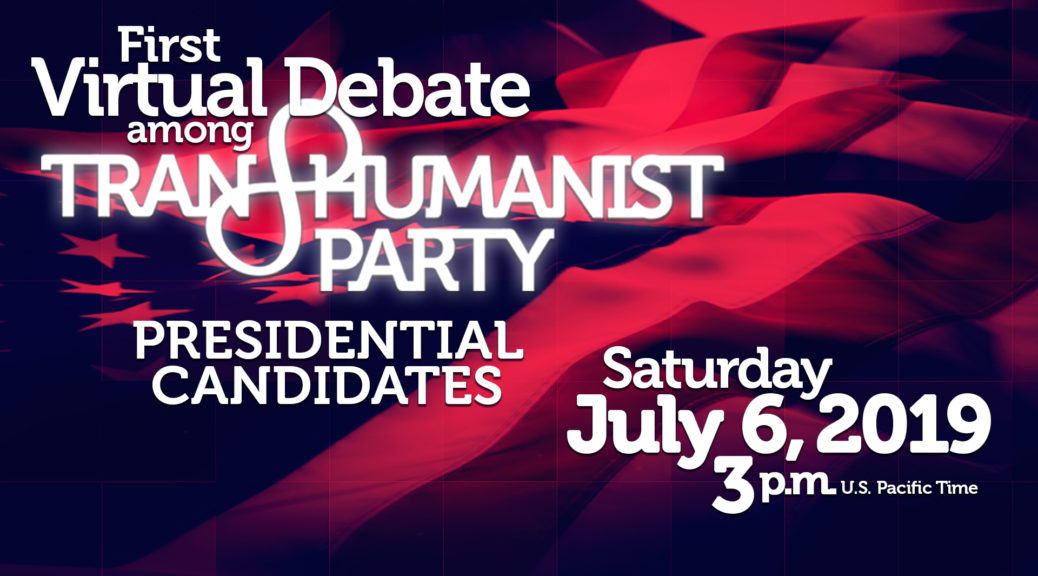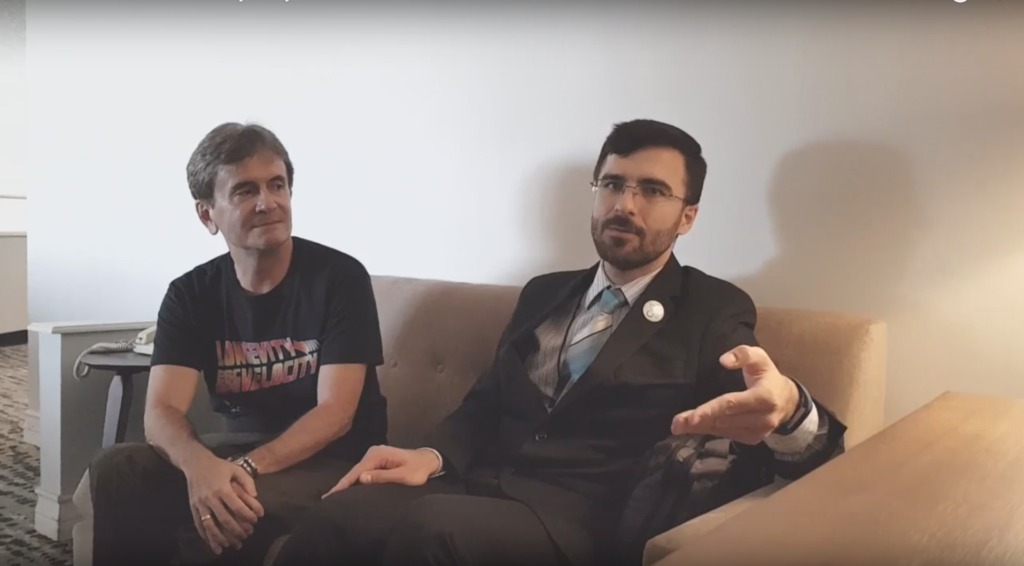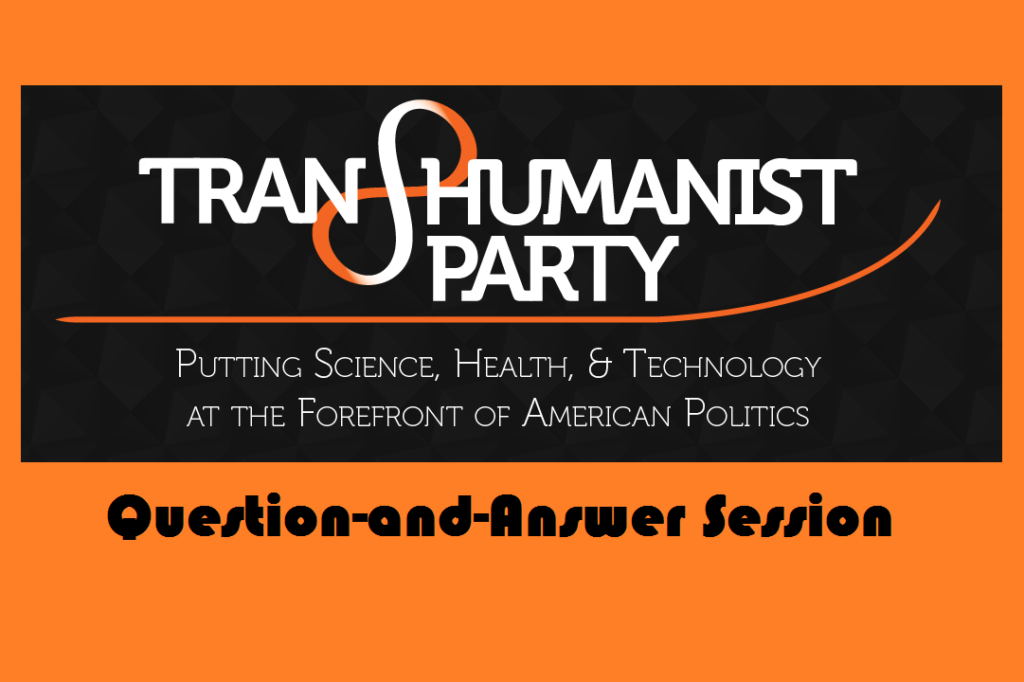U.S. Transhumanist Party and Nevada Transhumanist Party Positions on 2024 Nevada Ballot Questions

Gennady Stolyarov II
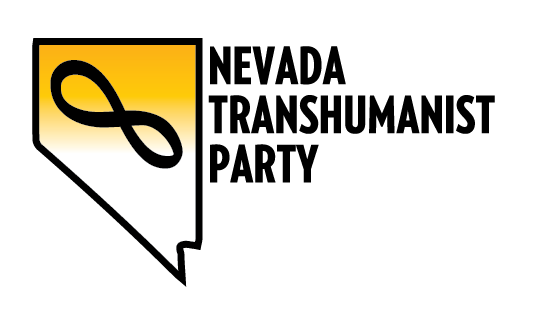
The United States Transhumanist Party and Nevada Transhumanist Party offer the following statements of position on the ballot questions currently before Nevada voters in the 2024 General Election.
Summary
Nevada State Question 1 – Remove Constitutional Status of Board of Regents Amendment: Neutral
Nevada State Question 2 – Revising Language Related to Public Entities for Individuals with Mental Illness, Blindness, or Deafness Amendment: Neutral
Nevada State Question 3 – Top-Five Ranked-Choice Voting Initiative: Strongly Support
Nevada State Question 4 – Remove Slavery as Punishment for Crime from Constitution Amendment: Support
Nevada State Question 5 – Sales Tax Exemption for Diapers Measure: Support
Nevada State Question 6 – Right to Abortion Initiative: Neutral
Nevada State Question 7 – Voter Identification Initiative: Oppose
Nevada State Question 1 – Remove Constitutional Status of Board of Regents Amendment
Wording of Question: “Shall the Nevada Constitution be amended to remove certain provisions governing the Board of Regents of the Nevada System of Higher Education and its administration of the State University and certain federal land grant funds and to provide additional legislative oversight of public institutions of higher education through regular independent audits, without repealing the current statutory election process or other existing statutory provisions relating to the Board of Regents?” (More information on BallotPedia.)
Position of the U.S. Transhumanist Party and Nevada Transhumanist Party: The U.S. Transhumanist Party and Nevada Transhumanist Party are generally neutral as to the structure of oversight over educational institutions and so do not take a strong position as to whether Nevada universities are overseen by a separately elected Board of Regents or directly by the Legislature. Furthermore, Ballot Question 1 would not actually dissolve the Board of Regents, but rather would place it under the oversight of the Legislature instead of its powers being provided for in the Nevada Constitution. Therefore, the day-to-day governance of Nevada’s State-funded higher-education institutions may not be changed in significant ways.
BallotPedia notes that “An amendment to remove the constitutional status of the Board of Regents was also on the 2020 ballot in Nevada. Voters defeated this amendment by 50.15%-49.85%.”
The U.S. Transhumanist Party and Nevada Transhumanist Party were similarly neutral on Ballot Question 1 in 2020. There was a favorable component of the 2020 Ballot Question 1, which is absent from the 2024 Ballot Question 1, and which would have mandated for the Legislature to provide by law for “the reasonable protection of individual academic freedom at Nevada’s public higher education institutions” –. The U.S. Transhumanist Party and Nevada Transhumanist Party are supportive of strengthening protections for individual academic freedom and regret that the current iteration of Ballot Question 1 did not preserve that aspect. The U.S. Transhumanist Party and Nevada Transhumanist Party do see some potential risks of politicization of higher education that may arise from Ballot Question 1 if a Legislature interferes directly in overseeing the content taught or the manner of individual expression permitted on a university campus, without specific protections for individual academic freedom being provided for by law.
However, the U.S. Transhumanist Party and Nevada Transhumanist Party would generally consider the issues involved in the structure of university governance to be outside the purview of specifically transhumanist political advocacy. Therefore, members are encouraged to vote their conscience on this ballot question by consulting their own individual understandings of the relevant matters.
Nevada State Question 2 – Revising Language Related to Public Entities for Individuals with Mental Illness, Blindness, or Deafness Amendment
Wording of Question: “Shall Section 1 of Article 13 of the Nevada Constitution be amended to: (1) revise the description of the persons who benefit from institutions that the State is required to foster and support; (2) replace the term “institutions” with “entities”; and (3) add entities for the benefit of persons with intellectual or developmental disabilities to the types of entities that the State is required to foster and support?” (More information on BallotPedia.)
Position of the U.S. Transhumanist Party and Nevada Transhumanist Party: The U.S. Transhumanist Party and Nevada Transhumanist Party are ultimately neutral on Ballot Question 2. Question 2 proposes to replace the current reference to “Institutions” with “Entities” and the current reference to benefiting “the Insane, Blind and Deaf and Dumb” with “persons with significant mental illness, persons who are blind or visually impaired, persons who are deaf or hard of hearing and persons with intellectual disabilities or developmental disabilities”. The U.S. Transhumanist Party and Nevada Transhumanist Party do not take a strong position on revising language solely with the intention of appearing more sensitive, or avoiding terms that some might perceive to be offensive, although this should not be the sole motivation for a change, and Section XL of the U.S. Transhumanist Party Platform does oppose “the doctrine of censorship, now prevalent on many college campuses in the United States, in the name of […] avoiding subjectively perceived offense.” Wording revisions to a Constitution, however, are not in themselves censorship, in that the expression of any idea by anyone is not being forcibly suppressed, and there may instead be a genuine attempt to determine what superior, more accurate, or more generally palatable wording to describe a particular subject matter might be.
There is a more substantive possible aspect to Ballot Question 2, which ultimately addresses which institutions or entities the State of Nevada would be constitutionally obligated to support. For instance, not all “persons with significant mental illness” might fit under the older category of “the Insane”, and the category of “persons with intellectual disabilities or developmental disabilities” is a new addition, as such persons should not rightfully be referred to as “Insane” under any framework. Proponents of Ballot Question 2 may consider it worthwhile for the State of Nevada to provide financial support to entities treating individuals with intellectual disabilities or developmental disabilities. However, the U.S. Transhumanist Party Platform and Transhumanist Bill of Rights – Version 3.0 ultimately do not take a position on whether such support should be governmentally provided. Article VII of the Transhumanist Bill of Rights – Version 3.0 states, “All sentient entities should be the beneficiaries of a system of universal health care. A system of universal health care does not necessitate any particular means, policy framework, source, or method of payment for delivering health care. A system of universal health care may be provided privately, by governments, or by some combination thereof, as long as, in practice, health care is abundant, inexpensive, accessible, and effective in curing diseases, healing injuries, and lengthening lifespans.” Therefore, it remains the decision of individual members of the U.S. and Nevada Transhumanist Parties regarding whether they would consider governmental support for treating individuals with intellectual disabilities or developmental disabilities to be the best means for overcoming those disabilities. It is possible for an individual member to agree with this, but it is also possible for another individual member to consider private institutions or individually motivated action to be more effective in overcoming at least some intellectual or developmental disabilities than State-funded institutions or entities might be.
Section XVIII of the U.S. Transhumanist Party Platform states that “The United States Transhumanist Party supports work to use science and technology to be able to eliminate all disabilities in humans who have them.” However, it is not clear whether any additional entities that would receive State support as a result of Ballot Question 2 would be focused on actually eliminating disabilities or only on helping people adapt to those disabilities. The latter may be a goal toward which some individual members of the U.S. and Nevada Transhumanist Parties may be sympathetic, but it is not a sufficiently or specifically transhumanist goal, nor is it one that the U.S. Transhumanist Party or Nevada Transhumanist Party take a position on – other than to express the hope that the individuals who are currently adapting to any disability will someday be freed from that disability through medical cures or technological augmentations that render the disability irrelevant to their day-to-day functioning.
Nevada State Question 3 – Top-Five Ranked-Choice Voting Initiative
Wording of Question: “Shall the Nevada Constitution be amended to allow all Nevada voters the right to participate in open primary elections to choose candidates for the general election in which all voters may then rank the remaining candidates by preference for the offices of U.S. Senators, U.S. Representatives, Governor, Lieutenant Governor, Secretary of State, State Treasurer, State Controller, Attorney General, and State Legislators?” (More information on BallotPedia.)
Position of the U.S. Transhumanist Party and Nevada Transhumanist Party: In the view of the U.S. Transhumanist Party and Nevada Transhumanist Party, this is the single most important ballot measure in Nevada political history, as it has the potential to break the stranglehold of the duopoly on Nevada politics. Voters already approved Ballot Question 3 once in 2022, by a vote of 52.94% in favor. However, the Nevada Constitution requires any ballot measures that provide amendments to the Constitution to be passed by voters twice. This 2024 election is therefore decisive for Ballot Question 3, and the U.S. Transhumanist Party and Nevada Transhumanist Party strongly encourage all Nevada residents who care about having genuine electoral choices to vote in support of Question 3.
The plurality of Nevada voters are independent of the major political parties, and yet they are currently unable to meaningfully influence many local races where a major-party primary determines that party’s nominee, who then receives no meaningful competition at the ballot box in the general election. Moreover, Nevada, as a “battleground” electoral state, often features great pressure applied on voters to support the “lesser evil”, despite many Nevada voters being rightly disillusioned with both the Republican and the Democratic “options” provided to them. Ranked-preference voting eliminates the incentive to vote strategically or for a “lesser evil” to the exclusion of one’s genuinely preferred candidate, since one can provide a complete rank-ordering of one’s preferences rather than limit oneself to one choice.
Section XXX of the U.S. Transhumanist Party Platform states that “The United States Transhumanist Party supports replacing the current ‘winner-take-all’ electoral system with proportional representation, ranked preference voting, and other devices to minimize the temptations by voters to favor a perceived ‘lesser evil’ rather than the candidates closest to those voters’ own preferences.” Thus, support for ranked-choice voting is directly embedded in our Platform. Furthermore, Section XIX of the USTP Platform reads, in part, “The United States Transhumanist Party supports an end to the two-party political system in the United States and a substantially greater inclusion of ‘third parties’ in the political process through mechanisms such as proportional representation and the elimination of stringent ballot-access requirements.” Allowing open access to primaries and enabling ranked-preference voting in the general election would certainly lower the barriers to entry to candidates who do not belong to either of the duopoly parties.
The U.S. Transhumanist Party has successfully implemented ranked-preference voting in multiple of its internal votes. There is every reason to expect that ranked-preference voting could be implemented with similar success for the much simpler top-five ballots in Nevada general elections that would be developed if Question 3 were to be approved by the voters (twice, the first time this year). The U.S. Transhumanist Party and Nevada Transhumanist Party strongly encourage every Nevada voter to support Ballot Question 3.
The opponents of Ballot Question 3 have included both the Republican and Democratic Parties and various politically connected special-interest advocacy groups; this should be quite revealing about what these establishment factions find to be threatening to their power. A ranked-choice voting system would break the ability of these powerful interests to manipulate the public through “lesser evil” arguments; politicians, to receive serious consideration, would actually have to at least pretend to be for the greater good rather than merely a lesser evil!
An astonishing and disgraceful plethora of misrepresentations about Ballot Question 3 have been propagated by the opposing establishment interests:
· Opponents claim that ranked-choice voting would be confusing to voters – as if people do not intuitively know how to rank-order their options; to suggest this is to insult the intelligence of nearly voter!
· Opponents claim that people would be forced to rank-order multiple candidates, when the text of the proposed Constitutional amendment specifically would allow a voter to “mark as many choices as the voter wishes” (Article 15, Section 18, Paragraph 3).
· Opponents claim that ranked-choice voting would violate the principle of “one person, one vote”, when in fact every eligible voter would still cast one ballot and would have the option to rank-order as many candidates as that voter wishes – from as few as one to as many as five. If a voter only chooses to indicate one candidate, or any number fewer than five, that voter is not disenfranchised by that voluntary decision, just as a person who is eligible to vote but chooses not to vote is not disenfranchised by their own choice. No serious argument can be made that the principle of “one person, one vote” is violated just because some people choose not to vote. By extension, no serious argument can be made that this principle would be violated just because some people would choose to rank-order fewer than all of the candidates.
For an extensive discussion of how ranked-choice voting works, the USTP encourages everyone to view our Virtual Enlightenment Salon with Kit Muehlman and FairVote Washington, as well as a subsequent, in-depth presentation by FairVote Washington on the technical workings of proportional ranked-choice voting.
Nevada State Question 4 – Remove Slavery as Punishment for Crime from Constitution Amendment
Wording of Question: “Shall the Ordinance of the Nevada Constitution and the Nevada Constitution be amended to remove language authorizing the use of slavery and involuntary servitude as a criminal punishment?” (More information on BallotPedia.)
Position of the U.S. Transhumanist Party and Nevada Transhumanist Party: The U.S. Transhumanist Party and Nevada Transhumanist Party support Ballot Question 4. The Transhumanist Bill of Rights – Version 3.0 states in Article XXV, “No sentient entity shall be held in slavery or involuntary servitude; slavery and the slave trade shall be prohibited in all their forms.” There are no exceptions provided for the prohibition on slavery and involuntary servitude in the Transhumanist Bill of Rights. Question 4 would align the Nevada State Constitution with the Transhumanist Bill of Rights.
It has been noted in the various explanations of this ballot question that it would not result in the abolition of prison work programs, which may, if administered properly, have benefits such as enabling prisoners to learn marketable skills and to have a path toward integration into peaceful and productive economic life upon their release from prison. However, the prohibition of involuntary servitude would mean that prisoners would have the prerogative to opt into those work programs, and that prison labor would not be used as punishment for an offense in and of itself. The U.S. Transhumanist Party and Nevada Transhumanist Party would concur that prison work programs should be voluntary for the prisoners and should be offered as opportunities, not as punishments.
Nevada State Question 5 – Sales Tax Exemption for Diapers Measure
Wording of Question: “Shall the Sales and Use Tax Act of 1955 be amended to provide an exemption from the taxes imposed by this Act on the gross receipts from the sale and the storage, use or other consumption of diapers?” (More information on BallotPedia.)
Position of the U.S. Transhumanist Party and Nevada Transhumanist Party: Section XXXVI of the U.S. Transhumanist Party Platform expresses support for “a flat percentage-of-sales tax applicable only to purchases from businesses whose combined nationwide revenues from all affiliates exceed a specified threshold.” The U.S. Transhumanist Party, in its most recent Exposure Period, considered an amendment to Section XXXVI, which would add the language, “This tax would not be imposed on life necessities, defined as goods that are consumable in the near term and whose primary purpose is to facilitate human survival.” The Nevada Transhumanist Party already included this language on July 26, 2024, within Section V of the Nevada Transhumanist Party Platform.
Currently, the State of Nevada lacks an income tax and has a state sales tax, from which various goods considered to be necessities are excluded. Diapers can be considered to facilitate the survival, with a basic amount of dignity, of certain humans who need them. Based on the principle that the cost of necessities should be excluded from any manner of sales tax, which already appears to be reflected in Nevada law and in the Nevada Transhumanist Party Platform, and which also did not meet any opposition during the Exposure Period for Platform Vote #9, the U.S. Transhumanist Party and Nevada Transhumanist Party support Ballot Question 5.
Nevada State Question 6 – Right to Abortion Initiative
Wording of Question: “Should the Nevada Constitution be amended to create an individual’s fundamental right to an abortion, without interference by state or local governments, whenever the abortion is performed by a qualified healthcare professional until fetal viability or when necessary to protect the health or life of the pregnant individual at any point during the pregnancy?” (More information on BallotPedia.)
Position of the U.S. Transhumanist Party and Nevada Transhumanist Party: The U.S. Transhumanist Party and Nevada Transhumanist Party are intentionally and conscientiously neutral on the question of abortion, which is one of the most divisive and intractable issues in American politics today. Its intractability stems from the existence of an inherent conflict of rights, which cannot be resolved using contemporary technology.
Section LXXXIV of the U.S. Transhumanist Party Platform offers a potential future solution to this divisive issue in the form of ectogenesis, “the ability of organisms to be incubated and to grow to the point of independent survival, within an artificial environment that provides such organisms with all the necessities of biological survival and development.” Ectogenesis posses the promise of “alleviating the burdens of human pregnancy and rendering the divisive debate over abortion obsolete by reconciling the right to life of a fetus with the freedom of a woman to choose not to carry that fetus.”
However, ectogenesis for humans is not yet available. During the present time, abortion is being utilized to an escalating extent by both major political parties as a wedge issue designed, through the extreme responses to it from both sides, to polarize and divide the population over situations that are unlikely to affect most people personally. It is for this reason that the U.S. Transhumanist Party de-emphasizes the abortion issue in its Platform and rhetoric. Under the status quo, this issue cannot be constructively resolved. We need technology, such as ectogenesis, to render abortion, and especially the abortion debate, obsolete.
The U.S. Transhumanist Party’s founder, Zoltan Istvan, who is personally a supporter of abortion rights, articulated this point of view in his August 3, 2019, editorial in the New York Times, “The Abortion Debate Is Stuck. Are Artificial Wombs the Answer?”
The U.S. Transhumanist Party also recognizes that its members have a broad spectrum of views on the abortion issue. The USTP, in striving to be a big-tent organization, has intentionally avoided creating any manner of litmus test on this issue vis-à-vis its membership.
The U.S. Transhumanist Party does note, by way of a factual observation, that abortion is currently legal in Nevada statute up to 24 weeks (6 months), and thus if Ballot Question 6 is defeated, this would not affect the status quo in regard to the legality and availability of abortions in Nevada. Ballot Question 6 proposes to establish a right to abortion within the Nevada Constitution and would extend the timeframe of legal abortion “until fetal viability or when necessary to protect the health or life of the pregnant individual at any point during the pregnancy”. If enacted, Ballot Question 6 would thus likely broaden the timeframe during which abortions would be legal, in many cases substantially beyond 6 months.
Accordingly, individual members are free to vote their conscience, or to abstain from voting, on Ballot Question 6, however they may choose.
Nevada State Question 7 – Voter Identification Initiative
Wording of Question: “Should the Nevada Constitution be amended to require voters to either present photo identification to verify their identity when voting in-person or to provide certain personal information to verify their identity when voting by mail ballot?” (More information on BallotPedia.)
Position of the U.S. Transhumanist Party and Nevada Transhumanist Party: The U.S. Transhumanist Party and Nevada Transhumanist Party seek to render it easier, not harder, for people (and sentient entities more generally) to be able to vote in elections. As a party with the broadest franchise of any organization known to it – extending the prerogative for Allied Membership to “any being capable of logical reasoning and of the expression of political opinions” (U.S. Transhumanist Party Constitution, Article II, Section X) – and enabling Allied Members to vote in its internal elections, the USTP is supportive of making voting as accessible as possible to as many sentient entities as possible. The USTP practices this in its internal voting processes, where electronic, ranked-preference voting has been used with significant success and with robust verification that only genuine USTP members (and not, for instance, non-sentient bots that serve a particular special interest) have been the ones casting votes.
While it is not inherently in conflict with the USTP’s values to require some manner of identification to render a person eligible to vote, the USTP does not consider a requirement of voter identification at the time of voting to be necessary for this purpose. When an individual registers to vote, it is already the case in Nevada that one of several listed forms of identification needs to be produced to demonstrate that this person is a U.S. citizen residing in the district where this person is seeking to register to vote. It is not necessary, once a person is registered to vote, to duplicatively require the same voter identification when that person seeks to cast their ballot. Per the official Arguments Against Passage of Question 7 on the Nevada Sample Ballot, “impersonating someone else at the polls [almost] never happens. One study found that that out of more than a billion votes cast, it happened 31 times – statistically zero. You have a better chance of getting struck by lightning.”
Furthermore, requiring hard-copy voter identification at the time of voting reinforces an already-obsolete paper-based voting system which should, as soon as the technology is viable and deployable at scale, be replaced with an electronic, blockchain-based system using which people could securely verify their identities and vote from the comfort of their homes.
In practice, Ballot Question 7 would limit who is able to vote in Nevada and would, through procedural barriers, deprive some number of U.S. citizens who are legally eligible to vote and properly registered to vote from being able to vote in practice. The U.S. Transhumanist Party and Nevada Transhumanist Party view such an outcome as contrary to their support for enfranchising more sentient entities. Accordingly, the U.S. Transhumanist Party and Nevada Transhumanist Party are opposed to Ballot Question 7.

